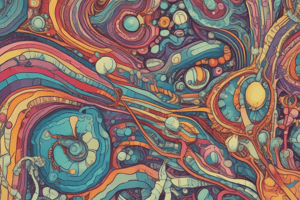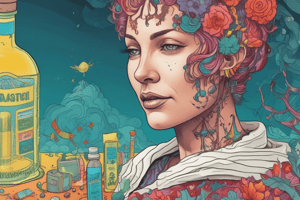Podcast
Questions and Answers
What is a common characteristic of narcolepsy?
What is a common characteristic of narcolepsy?
- Nightly episodes of sleepwalking
- Inability to remember dreams
- Frequent nightmares during REM sleep
- Irrepressible need for daytime sleep (correct)
What primary function does automatic processing serve?
What primary function does automatic processing serve?
- To eliminate the need for any cognitive effort
- To enhance memory retention for all data received
- To allow for full conscious awareness of all sensory information
- To sift through sensory information and determine importance (correct)
Which concept refers to our ability to focus on specific stimuli while ignoring others?
Which concept refers to our ability to focus on specific stimuli while ignoring others?
- Sensory overload
- Automatic processing
- Multitasking
- Selective attention (correct)
What does sleepwalking primarily involve?
What does sleepwalking primarily involve?
How does dream content typically relate to waking life?
How does dream content typically relate to waking life?
Which of the following is a defining feature of obstructive sleep apnea?
Which of the following is a defining feature of obstructive sleep apnea?
What is a typical symptom of REM sleep behavior disorder?
What is a typical symptom of REM sleep behavior disorder?
Which of the following is NOT a potential means of achieving altered states of consciousness?
Which of the following is NOT a potential means of achieving altered states of consciousness?
During what state of consciousness does a person typically experience altered perceptions?
During what state of consciousness does a person typically experience altered perceptions?
What is one potential consequence if automatic processing were impaired?
What is one potential consequence if automatic processing were impaired?
What primarily distinguishes circadian rhythms from other biological processes?
What primarily distinguishes circadian rhythms from other biological processes?
What characterizes insomnia?
What characterizes insomnia?
What is a common experience reported by individuals who do not remember dreaming?
What is a common experience reported by individuals who do not remember dreaming?
Which of the following accurately describes a potential impact of sleep deprivation?
Which of the following accurately describes a potential impact of sleep deprivation?
What distinguishes sleep terrors from nightmares?
What distinguishes sleep terrors from nightmares?
Which of the following drugs acts primarily as a depressant and can lead to loss of consciousness?
Which of the following drugs acts primarily as a depressant and can lead to loss of consciousness?
Which class of drugs is associated with decreased neural activity and relaxation?
Which class of drugs is associated with decreased neural activity and relaxation?
What is a primary effect of hallucinogens like LSD?
What is a primary effect of hallucinogens like LSD?
Which stimulant can lead to serious psychological effects such as anxiety and psychosis?
Which stimulant can lead to serious psychological effects such as anxiety and psychosis?
What is one of the significant potential harms of using heroin?
What is one of the significant potential harms of using heroin?
Which psychoactive drug is known for its ability to stimulate appetite and suppress nausea?
Which psychoactive drug is known for its ability to stimulate appetite and suppress nausea?
What serious health risk is associated with long-term use of methamphetamine?
What serious health risk is associated with long-term use of methamphetamine?
What is the primary purpose of experiencing various altered states of consciousness?
What is the primary purpose of experiencing various altered states of consciousness?
Caffeine is primarily classified as which type of drug?
Caffeine is primarily classified as which type of drug?
What effect does tobacco have on the body's pain tolerance?
What effect does tobacco have on the body's pain tolerance?
MDMA is commonly associated with which of the following effects?
MDMA is commonly associated with which of the following effects?
Flashcards are hidden until you start studying
Study Notes
Psychoactive Drugs
- Psychoactive drugs alter psychological activities by acting on the central nervous system.
- Popular psychoactive substances include alcohol, caffeine, and cocaine.
MK-Ultra
- MK-Ultra explored using LSD for mind control, war tactics against communism, and as a potential truth serum.
Drug Quick Reference Guide
- Alcohol: Depressant; causes disinhibition and relaxation but can lead to coma or death.
- Barbiturates: Depressant; promotes relaxation, but overdose can cause coma or death.
- Caffeine: Stimulant; increases alertness but may lead to insomnia or anxiety.
- Cocaine: Stimulant; induces euphoria but poses risks like heart attack or stroke.
- Heroin: Depressant; creates intense pleasure but risks include liver disease and spontaneous abortion.
- LSD: Hallucinogen; alters perception and mood, with potential long-lasting psychological effects.
- Marijuana: Hallucinogen; can enhance sensory experiences but may impair memory and attention.
- MDMA: Stimulant & hallucinogen; provides euphoria but risks include severe dehydration and possible seizures.
- Methamphetamine: Stimulant; heightens energy, but leads to serious health issues including psychosis.
- Opioids: Depressant; effective for pain relief, but poses overdose risks and respiratory problems.
- Tobacco: Stimulant; promotes alertness but is linked to serious cardiovascular and cancer risks.
Consciousness
- Consciousness is the state of being aware of something, whether internally or externally.
- Automatic processing enables the brain to handle substantial sensory information without conscious effort.
- Sensory overload may occur due to variations in automatic processing efficiency.
Altered States of Consciousness
- Altered states can arise from drugs, sleep, hypnosis, meditation, sensory deprivation, or neurological abnormalities.
Sleep
- REM sleep allows for dreaming, about 1–2 hours nightly, reflecting daily activities and emotions.
- Sleep disturbances include narcolepsy, REM sleep behavior disorder, obstructive sleep apnea, insomnia, sleepwalking, and sleep terrors.
- Narcolepsy: Characterized by excessive daytime sleepiness and sudden sleep attacks.
- REM Sleep Behavior Disorder: Actions during dreams due to malfunctioning paralysis mechanism, posing injury risks.
- Obstructive Sleep Apnea: Airway collapse during sleep leading to gasping and disrupted sleep.
- Insomnia: Challenges in falling asleep or staying asleep, often leading to fatigue.
- Sleepwalking: Complex behaviors during sleep with limited recall post-episode.
- Sleep Terrors: Episodes of screaming and fear, primarily in children, with no recollection the following day.
Studying That Suits You
Use AI to generate personalized quizzes and flashcards to suit your learning preferences.




